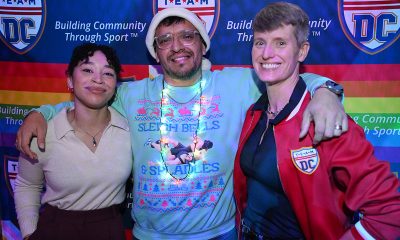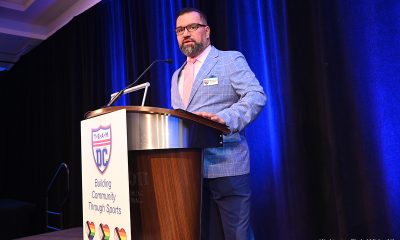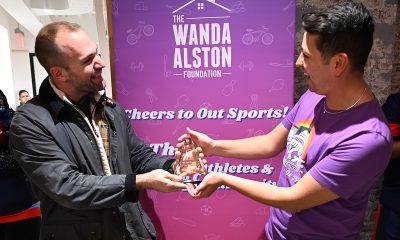Sports
Team DC scholars: Where are they now?
Catching up with 3 award-winning student athletes
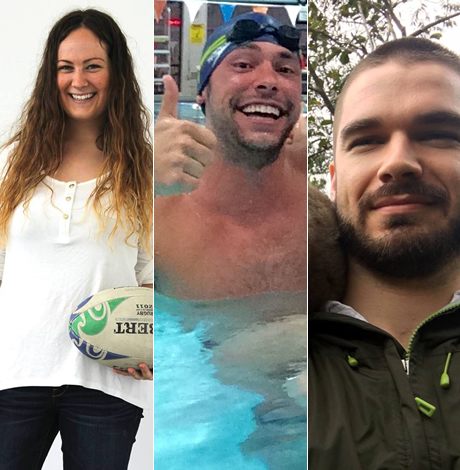
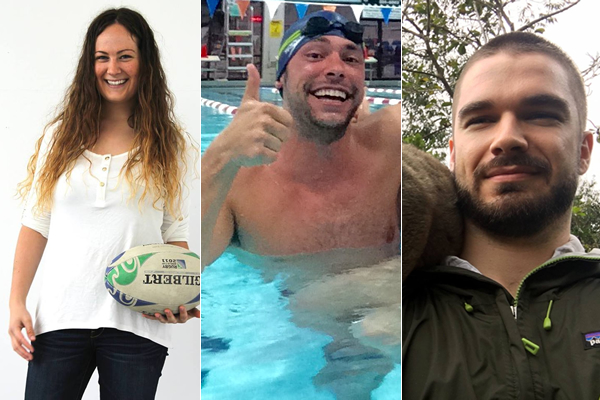
From left, Becca Stussman, Danny Martinelli and Michael Hull. (Photos courtesy of the subjects)
One surprising commonality about the back stories of the Team DC college scholarship winners is that, in many cases, the young athletes came out to their teammates before they came out to their friends and family.
Launched in 2008, the Team DC College Scholarship Fund has awarded more than $50,000 to 48 openly LGBT student-athletes in the D.C. area. It was one of the first scholarship programs in the United States to acknowledge the challenges that young students face when they compete as out athletes.
“There is safety, love and acceptance coming from the teammates of these young athletes. Much more than from society as a whole,” says Team DC founder and executive director, Brent Minor. “We knew that there were high school LGBT athletes out there playing and we wanted to validate their experience and highlight them to the coaches, athletic directors and parents.”
The scholarship winners have run the gamut of sports ranging from swimming to baseball to cheerleading. One thing that hasn’t been a surprise about the winners is that they have grown into successful adults with a sense of community outreach. One of the criteria for being granted the award is the potential for that quality of character.
In 2008, one of the first scholarships was given to Danny Martinelli who would go on to become a NCAA Division III swimmer at Marymount University and receive a degree in history. In attendance at the award ceremony in 2008 were two young girls with intellectual and developmental disabilities who Martinelli was mentoring in the pool. Eight years later he is still giving them developmental swim lessons, sometimes as many as four nights a week.
“The drill work I do with the girls requires a lot of time because I am actually in the water with them working toward the goal of building muscle memory,” says Martinelli. “I love instructing them in swimming and it is an important life skill for them to have. They are fearless.”
Martinelli grew up in Vienna, Va., and started swimming at age seven through the York Swim Club program. As a member of a family with a low socioeconomic status, his scholarship was used to pay for swimming gear and a training camp in Florida with his Marymount teammates.
“The scholarship was a tremendous help and I was very grateful,” Martinelli says. “I was so uncomfortable swimming as a gay man. I think the award helps to raise awareness and allows for students to become more comfortable in sports.”
Martinelli is finishing up his master’s degree at Marymount and also taking graduate classes at Johns Hopkins University. He plans to become an educator with a focus on urban, inner city educational reform.
Earlier this year, Martinez travelled to Peru as part of his duties with Virginia International University as an admissions & enrollment officer.
“We did a three-week phase one tour recruiting prospective students in rural and poor communities,” says Martinelli. “It was very fruitful and I loved that I was able to use my Spanish skills. We will be going back next year for phase two to develop partnerships.”
Michael Hull was one of the recipients of the scholarship in its second year. He left for Ball State in 2009 and transferred to George Mason University where he received a degree in kinesiology and nutritional science.
Hull wrapped up his employment as a researcher at Examine.com earlier this summer where he compiled literature on supplements. He will begin his master’s and doctorate work in human nutrition this fall at McGill University in Montreal.
“I am interested in changing my focus to clinical nutrition,” says Hull, “to put strategies in place for patients to be in a better place for post-operative recovery.”
Originally from Reston, Va., Hull played volleyball through high school and when time allowed, played in adult leagues during college. He was unable to attend the Team DC scholarship reception in 2009 because his Mormon parents would not have understood.
“I couldn’t go to the reception because I hadn’t told my parents that I had won the scholarship,” Hull says. “I was amazed that the award even existed and it was like an olive branch was being extended to me. I attended the reception the following year to show my appreciation.”
Hull has had the good fortune to find a group of friends to explore the world with and has traveled to Madagascar, Thailand, Mexico, Europe and Canada along with stateside destinations. During his preparations to move to Montreal this summer, he served for the third year as a student dietician at Setebaid, a Type-1 diabetes camp for kids.
“I am looking forward to the next part of my life in Montreal,” says Hull. “I have traveled there many times and the locals are very welcoming to everyone.”
Becca Stussman grew up in Olney, Md., and played multiple sports, including soccer, softball and basketball. She was part of the pilot program of Best Buddies at her high school serving as president.
The Best Buddies program fosters acceptance and inclusion of those with disabilities. Her work included encouraging participation in sports such as bocce, softball and track and field.
Stussman went on to attend Columbia University where she played club rugby all four years and created a new chapter of Best Buddies for her college.
“Playing rugby at Columbia really defined my college experience,” says Stussman. “As for Best Buddies, I was able to make connections on the administrative levels outside of Maryland to form the New York chapter.”
Stussman graduated from Columbia in the spring with a degree in mechanical engineering and will be working in New York in engineering consulting. Her Team DC scholarship was awarded in 2012.
“I was really excited to receive that award because it directly applied to someone like me,” says Stussman. “I might not have been honored otherwise.”
She is hoping to stay involved with Best Buddies in New York through their citizens program, which includes outings to museums, picnics and social gatherings. Her rugby future may also continue if time permits.
“I am hoping to play with the New York Rugby Club,” says Stussman. “Even if I don’t, I will still hang out with the team. I love the energy in New York.”
The 2016 Team DC College Scholarship Winners
• Jauan Durbin, School Without Walls High School, D.C./Morehouse College
• Adonis Garcia, Cardozo High School, D.C./Marymount University
• Joshua Hicks, Chesapeake High School, Pasadena, Md./University of Maryland
• Jasmine Johnson, Ballou High School, D.C./Delaware State University
• Stephen Lambert, Northern Virginia Community College/George Mason University
• Daja Latten, Cardozo High School, D.C./Virginia State University
• Elaina Perry, Eleanor Roosevelt High School, Greenbelt, Md./American University
Sports
Attitude! French ice dancers nail ‘Vogue’ routine
Cizeron and Fournier Beaudry strike a pose in memorable Olympics performance

Madonna’s presence is being felt at the Olympic Games in Italy.
Guillaume Cizeron and his rhythm ice dancing partner Laurence Fournier Beaudry of France performed a flawless skate to Madonna’s “Vogue” and “Rescue Me” on Monday.
The duo scored an impressive 90.18 for their effort, the best score of the night.
“We’ve been working hard the whole season to get over 90, so it was nice to see the score on the screen,” Fournier Beaudry told Olympics.com. “But first of all, just coming out off the ice, we were very happy about what we delivered and the pleasure we had out there. With the energy of the crowd, it was really amazing.”
Watch the routine on YouTube here.
Italy
Olympics Pride House ‘really important for the community’
Italy lags behind other European countries in terms of LGBTQ rights

The four Italian advocacy groups behind the Milan Cortina Winter Olympics’ Pride House hope to use the games to highlight the lack of LGBTQ rights in their country.
Arcigay, CIG Arcigay Milano, Milano Pride, and Pride Sport Milano organized the Pride House that is located in Milan’s MEET Digital Culture Center. The Washington Blade on Feb. 5 interviewed Pride House Project Manager Joseph Naklé.
Naklé in 2020 founded Peacox Basket Milano, Italy’s only LGBTQ basketball team. He also carried the Olympic torch through Milan shortly before he spoke with the Blade. (“Heated Rivalry” stars Hudson Williams and Connor Storrie last month participated in the torch relay in Feltre, a town in Italy’s Veneto region.)
Naklé said the promotion of LGBTQ rights in Italy is “actually our main objective.”
ILGA-Europe in its Rainbow Map 2025 notes same-sex couples lack full marriage rights in Italy, and the country’s hate crimes law does not include sexual orientation or gender identity. Italy does ban discrimination based on sexual orientation in employment, but the country’s nondiscrimination laws do not include gender identity.
ILGA-Europe has made the following recommendations “in order to improve the legal and policy situation of LGBTI people in Italy.”
• Marriage equality for same-sex couples
• Depathologization of trans identities
• Automatic co-parent recognition available for all couples
“We are not really known to be the most openly LGBT-friendly country,” Naklé told the Blade. “That’s why it (Pride House) was really important for the community.”
“We want to use the Olympic games — because there is a big media attention — and we want to use this media attention to raise the voice,” he added.

Naklé noted Pride House will host “talks and roundtables every night” during the games that will focus on a variety of topics that include transgender and nonbinary people in sports and AI. Another will focus on what Naklé described to the Blade as “the importance of political movements now to fight for our rights, especially in places such as Italy or the U.S. where we are going backwards, and not forwards.”
Seven LGBTQ Olympians — Italian swimmer Alex Di Giorgio, Canadian ice dancers Paul Poirier and Kaitlyn Weaver, Canadian figure skater Eric Radford, Spanish figure skater Javier Raya, Scottish ice dancer Lewis Gibson, and Irish field hockey and cricket player Nikki Symmons — are scheduled to participate in Pride House’s Out and Proud event on Feb. 14.
Pride House Los Angeles – West Hollywood representatives are expected to speak at Pride House on Feb. 21.
The event will include a screening of Mariano Furlani’s documentary about Pride House and LGBTQ inclusion in sports. The MiX International LGBTQ+ Film and Queer Culture Festival will screen later this year in Milan. Pride House Los Angeles – West Hollywood is also planning to show the film during the 2028 Summer Olympics.
Naklé also noted Pride House has launched an initiative that allows LGBTQ sports teams to partner with teams whose members are either migrants from African and Islamic countries or people with disabilities.
“The objective is to show that sports is the bridge between these communities,” he said.
Bisexual US skier wins gold
Naklé spoke with the Blade a day before the games opened. The Milan Cortina Winter Olympics will close on Feb. 22.
More than 40 openly LGBTQ athletes are competing in the games.
Breezy Johnson, an American alpine skier who identifies as bisexual, on Sunday won a gold medal in the women’s downhill. Amber Glenn, who identifies as bisexual and pansexual, on the same day helped the U.S. win a gold medal in team figure skating.
Glenn said she received threats on social media after she told reporters during a pre-Olympics press conference that LGBTQ Americans are having a “hard time” with the Trump-Vance administration in the White House. The Associated Press notes Glenn wore a Pride pin on her jacket during Sunday’s medal ceremony.
“I was disappointed because I’ve never had so many people wish me harm before, just for being me and speaking about being decent — human rights and decency,” said Glenn, according to the AP. “So that was really disappointing, and I do think it kind of lowered that excitement for this.”
Puerto Rico
Bad Bunny shares Super Bowl stage with Ricky Martin, Lady Gaga
Puerto Rican activist celebrates half time show

Bad Bunny on Sunday shared the stage with Ricky Martin and Lady Gaga at the Super Bowl halftime show in Santa Clara, Calif.
Martin came out as gay in 2010. Gaga, who headlined the 2017 Super Bowl halftime show, is bisexual. Bad Bunny has championed LGBTQ rights in his native Puerto Rico and elsewhere.
“Not only was a sophisticated political statement, but it was a celebration of who we are as Puerto Ricans,” Pedro Julio Serrano, president of the LGBTQ+ Federation of Puerto Rico, told the Washington Blade on Monday. “That includes us as LGBTQ+ people by including a ground-breaking superstar and legend, Ricky Martin singing an anti-colonial anthem and showcasing Young Miko, an up-and-coming star at La Casita. And, of course, having queer icon Lady Gaga sing salsa was the cherry on the top.”
La Casita is a house that Bad Bunny included in his residency in San Juan, the Puerto Rican capital, last year. He recreated it during the halftime show.
“His performance brought us together as Puerto Ricans, as Latin Americans, as Americans (from the Americas) and as human beings,” said Serrano. “He embraced his own words by showcasing, through his performance, that the ‘only thing more powerful than hate is love.’”
-

 State Department5 days ago
State Department5 days agoFOIA lawsuit filed against State Department for PEPFAR records
-

 Opinions5 days ago
Opinions5 days agoTrans sports bans rooted in eugenics
-

 New York5 days ago
New York5 days agoPride flag raised at Stonewall after National Park Service took it down
-

 India5 days ago
India5 days agoTrans students not included in new India University Grants Commission equity rules

